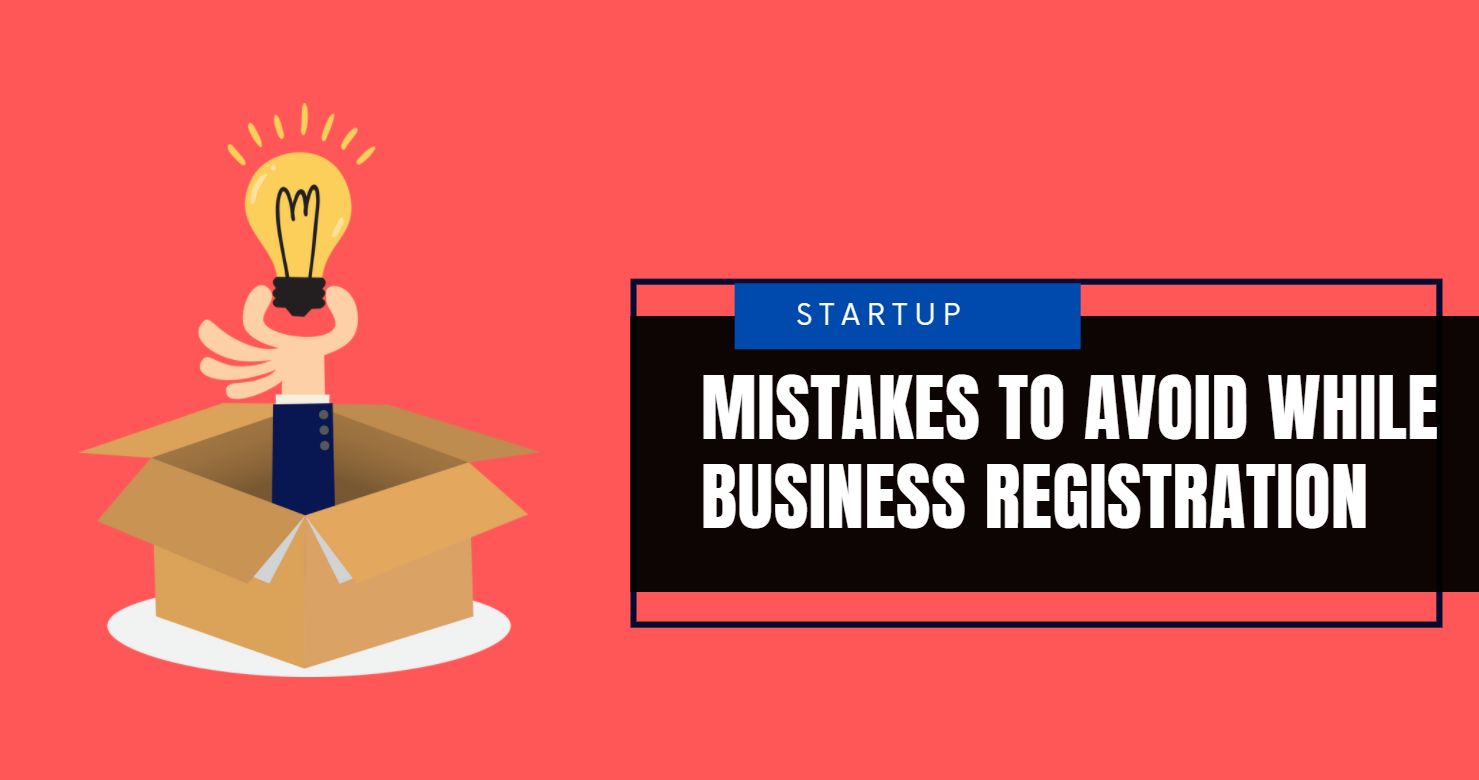
Start-ups in India: The Most Common Registration Mistakes
Meetings, timetables, timelines…everything must be completed on time or you will be screamed at or fired from your work. Having your own company seems far more appealing than following directions from your employer. A large number of recent graduates have already taken the plunge into business. The market is being taken over by entrepreneurs. Regardless, if we look at the data, there aren’t many new companies that have the potential to become major players in this war.
If you want to build your business or are currently in the process of doing so, you should learn from the mistakes made by others in their new venture.
Furthermore, in this post, we will look into the registration blunders made by the new companies in India, which you should avoid at all costs.
Start-up Registration Mistakes and How to Avoid Them
Every day, a slew of new enterprises form up; nevertheless, only a few of them can keep up with the competition. Furthermore, it is sometimes seen that, despite having a great and innovative idea, many new firms become stuck in their early phases. Their dissatisfaction in the early stages is due to registration errors.
Choosing the Correct Legal Structure
If you are new to the business, let us inform you that there are a variety of business structures in which you can register your company to begin your entrepreneurial journey. If we look at the current situation, we can see that you can register your business as a Private Limited Company or a Sole Proprietorship.
You should choose the entity carefully, considering its benefits and drawbacks. Before deciding on a business entity, you should consider the following questions: Which business entity should I choose?
It is necessary to think about it! Before getting into the industry for real, there are a few things you should know.
Business with a single owner
If we look around, we may observe several of the people heading about their business on their own. In any event, we never try to look at the tidbits of information about the company. Every organization, at some point or another, requires the aid of more than one person to function properly.
As your company grows, you’ll need to hire additional people to keep things running smoothly. To address various aspects of the business, you may need to consult experts.
Delaying the Business’s Launch
Hopefully, you are not someone who runs a company without registering it. If you have a tried-and-true method, don’t wait to register it with the government and receive valid insurance for your company and all employees.
The development of a firm requires financial backing. When choosing a business structure, you should be exceedingly cautious and unassuming to deal with capital and unanticipated challenges that may arise during your start-up’s growth.
Your Intellectual Property Isn’t Protected
Have you heard about the accusations that Facebook may be stolen at the beginning of the game? Indeed, it has been the subject of a Hollywood film. We don’t know how much truth wins, but there are occasional reports, news, and other accounts of ideas being stolen.
Would you be able to separate your company’s intellectual property or resources? Do you know how to secure and defend your concept?
In essence, there are two types of resources: tangible and intangible. Buildings, equipment, and other tangible resources are examples of tangible resources. Intangible resources, on the other hand, include unique product design, domain name, label, shape, business logo, and a unique combination of fixes that bring your services and products to market. Intellectual property encompasses these concepts and intangible assets.
Organizations should consult a legal expert to protect their intangible assets by registering them under material assurances such as patents, copyrights, and trademarks.
Non-disclosure Agreement Error During Registration
You can normally ask anyone who works for the company to sign a non-disclosure agreement. When you’re bringing someone on board or enlisting their help, you’ll need to explain the finer points of the business. In such circumstances, there is a risk of your concept being stolen.
Taxes Are Being Mismanaged.
It is a well-known fact that our Indian educational system does not educate about taxes or other aspects of them, which are necessary for everyone at some point in their lives.
Managing responsibilities is a separate responsibility when starting a firm. It is always advisable to hire someone in-house or outsource your task to ensure that it is completed on time. Before starting a business, you should seek advice from a firm where individuals can tell you about the registration process. Shop and establishment permits, GST registration, IEC (import-export out code), Professional Tax, and EPF are just a few of the registrations and licenses available.
Share This post!

Start-ups in India: The Most Common Registration Mistakes
Meetings, timetables, timelines…everything must be completed on time or you will be screamed at or fired from your work. Having your own company seems far more appealing than following directions from your employer. A large number of recent graduates have already taken the plunge into business. The market is being taken over by entrepreneurs. Regardless, if we look at the data, there aren’t many new companies that have the potential to become major players in this war.
If you want to build your business or are currently in the process of doing so, you should learn from the mistakes made by others in their new venture.
Furthermore, in this post, we will look into the registration blunders made by the new companies in India, which you should avoid at all costs.
Start-up Registration Mistakes and How to Avoid Them
Every day, a slew of new enterprises form up; nevertheless, only a few of them can keep up with the competition. Furthermore, it is sometimes seen that, despite having a great and innovative idea, many new firms become stuck in their early phases. Their dissatisfaction in the early stages is due to registration errors.
Choosing the Correct Legal Structure
If you are new to the business, let us inform you that there are a variety of business structures in which you can register your company to begin your entrepreneurial journey. If we look at the current situation, we can see that you can register your business as a Private Limited Company or a Sole Proprietorship.
You should choose the entity carefully, considering its benefits and drawbacks. Before deciding on a business entity, you should consider the following questions: Which business entity should I choose?
It is necessary to think about it! Before getting into the industry for real, there are a few things you should know.
Business with a single owner
If we look around, we may observe several of the people heading about their business on their own. In any event, we never try to look at the tidbits of information about the company. Every organization, at some point or another, requires the aid of more than one person to function properly.
As your company grows, you’ll need to hire additional people to keep things running smoothly. To address various aspects of the business, you may need to consult experts.
Delaying the Business’s Launch
Hopefully, you are not someone who runs a company without registering it. If you have a tried-and-true method, don’t wait to register it with the government and receive valid insurance for your company and all employees.
The development of a firm requires financial backing. When choosing a business structure, you should be exceedingly cautious and unassuming to deal with capital and unanticipated challenges that may arise during your start-up’s growth.
Your Intellectual Property Isn’t Protected
Have you heard about the accusations that Facebook may be stolen at the beginning of the game? Indeed, it has been the subject of a Hollywood film. We don’t know how much truth wins, but there are occasional reports, news, and other accounts of ideas being stolen.
Would you be able to separate your company’s intellectual property or resources? Do you know how to secure and defend your concept?
In essence, there are two types of resources: tangible and intangible. Buildings, equipment, and other tangible resources are examples of tangible resources. Intangible resources, on the other hand, include unique product design, domain name, label, shape, business logo, and a unique combination of fixes that bring your services and products to market. Intellectual property encompasses these concepts and intangible assets.
Organizations should consult a legal expert to protect their intangible assets by registering them under material assurances such as patents, copyrights, and trademarks.
Non-disclosure Agreement Error During Registration
You can normally ask anyone who works for the company to sign a non-disclosure agreement. When you’re bringing someone on board or enlisting their help, you’ll need to explain the finer points of the business. In such circumstances, there is a risk of your concept being stolen.
Taxes Are Being Mismanaged.
It is a well-known fact that our Indian educational system does not educate about taxes or other aspects of them, which are necessary for everyone at some point in their lives.
Managing responsibilities is a separate responsibility when starting a firm. It is always advisable to hire someone in-house or outsource your task to ensure that it is completed on time. Before starting a business, you should seek advice from a firm where individuals can tell you about the registration process. Shop and establishment permits, GST registration, IEC (import-export out code), Professional Tax, and EPF are just a few of the registrations and licenses available.







